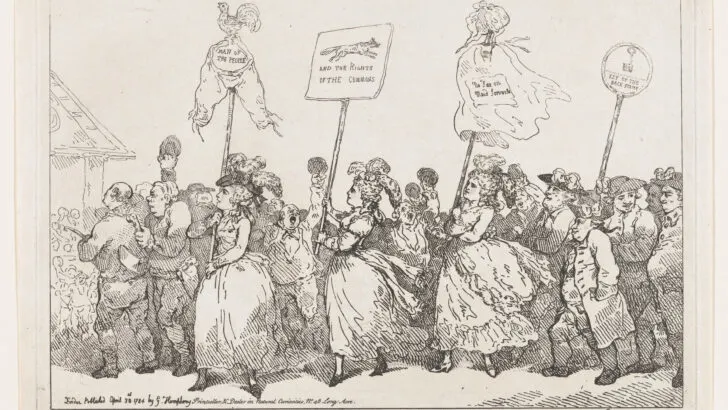Hustings are the speeches and campaign events associated with an election cycle.
“On the hustings” is a synonym for being out campaigning, but is often deployed because it sounds more colorful than “campaign trail.”
Origin of “Hustings”
The word itself derives from the Old Norse word “husthings,” or “house assembly,” which was a meeting of all the men in the household of a nobleman or a king.
The word entered Old English as “husting,” where it was used to mean any meeting or tribunal.
By the early 18th century, the word was used to mean a “temporary platform for political speeches;” the meaning eventually shifted to include the election process as a whole.
“Hustings” is probably more commonly used in the UK and in Canada than it is in the United States.
The BBC notes that the word has a very rough and tumble connotation, implying combat and improvisation:
“The most famous election in literature, at Eatanswill, in Dickens’s The Pickwick Papers, sees the unfortunate Mr Pickwick accidentally pushed up on to the hustings platform where he looks down on a scene ‘from whence arose a storm of groans, and shouts, and yells, and hootings, that would have done honour to an earthquake.’”

In America, too, the word “hustings” connotes energy and activity, rather than staid fundraisers or political ads or TV. The word is used to imply that a candidate is busy being a go-getter.
In 2016, the Huffington Post described Bernie Sanders in this way:
Bernie had a good week on the hustings, pulling in a whopping 27,000 people to a rally in Washington Square Park, and chalking up his first Senate endorsement to boot.
Ross Douthat, writing about Ted Cruz in the same year, used the phrase to evoke Cruz’s hard working, tireless style:
Cruz will be back, no doubt. He’s young, he’s indefatigable, and he can claim — and will claim, on the 2020 hustings — that True Conservatism has as yet been left untried. But that will be a half-truth; it isn’t being tried this year because the Republican Party’s voters have rejected him and it, as they rejected another tour for Bushism when they declined to back Rubio and Jeb.
In 2020, the Washington Post argued that “sweat equity” plays a major role in elections.
Victory often goes to the candidate who’s willing to put in the time to rally voters, the Post argued; this might give President Trump an edge over Joe Biden in the upcoming election:
Biden-in-the-basement has worked well so far, but he may not be able to compete with a fully unleashed Trump on the hustings. Trump is part showman, part chief marketing officer, part bomb-thrower.
Hustings are, in general, an opportunity for throwing political barbs, slinging mud, and casting aspersions on one’s opponents. When a candidate is on the hustings, he or she is not being genteel.
The Business Times used the term to evoke the scrappy atmosphere of the 2020 Democratic primary season:
As Senator Kamala Harris pointed out during the hustings, Mr Biden has a long record of supporting legislation which many believe was socially divisive, and which the powerful Black Lives Matter movement may find objectionable.
Use of “Hustings” in a sentence
- The candidate tirelessly traveled from town to town, engaging with voters on the hustings to build rapport and garner support for the upcoming election.
- The spirited debates on the hustings provided a platform for candidates to articulate their policy positions and respond to the concerns of the electorate, fostering a direct connection between the public and those vying for office.
- As the political season heated up, the hustings became a battleground where candidates not only promoted their agendas but also faced scrutiny and challenge from rivals and voters alike, reflecting the vibrancy of the democratic process.